Chilcot report as it happened: Judgement day for Tony Blair as much delayed Iraq War inquiry published
Live updates as Sir John Chilcot finally unveils report seven years in the making
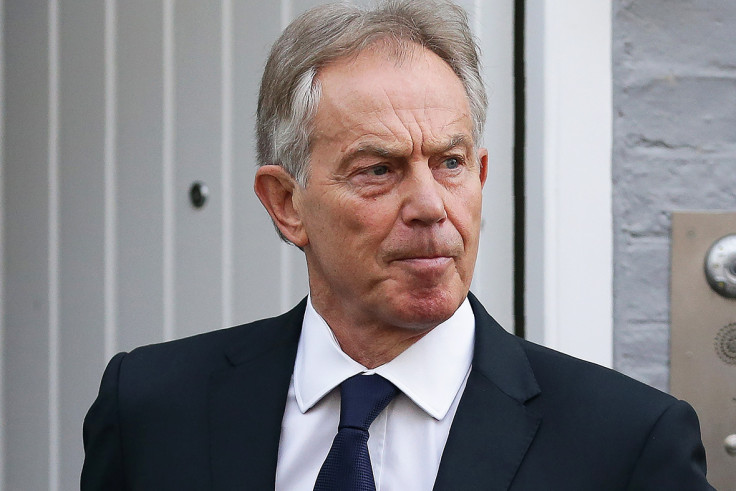
- Highly anticipated and much delayed report into Iraq War published.
- John Chilcot said military action in Iraq 'was not a last resort'
- David Cameron and Jeremy Corbyn gave statements in House of Commons.
- Tony Blair said he expressed "sorrow, regret and apology" in response to the report
This concludes our live coverage of the Chilcot Inquiry. For more updates stay with IBTimes UK
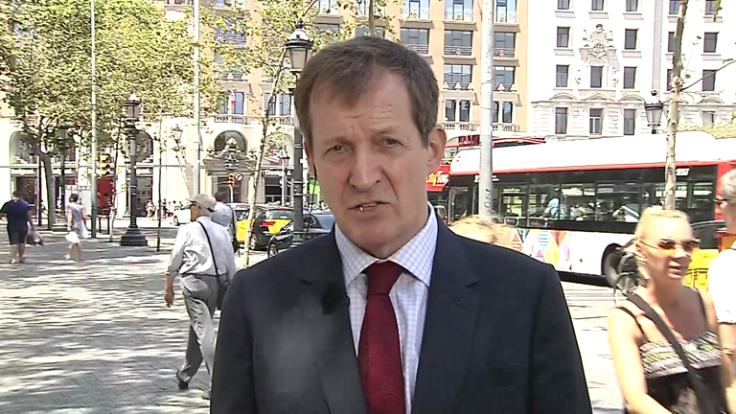
Alastair Campbell has made a robust defence of his former boss Tony Blair following the release of the Chilcot report.
Another emotional respsone from Blair when asked about his his regret for starting the war.
He said:
There is no inconsistency in expressing my sorrow for those that have lost their lives, my regret and my apology for the mistakes but still saying I believe the decision was right.
There is no inconsistency in that. I understand why that makes some people at least angry with me... In the end, I'm sorry again if people find that difficult to reconcile but I spend so much of my time thinking about this issue, I spend so much of my life analysing it, I would be making a concession I didn't believe if I said to you 'I think if we left him there we'd be better'
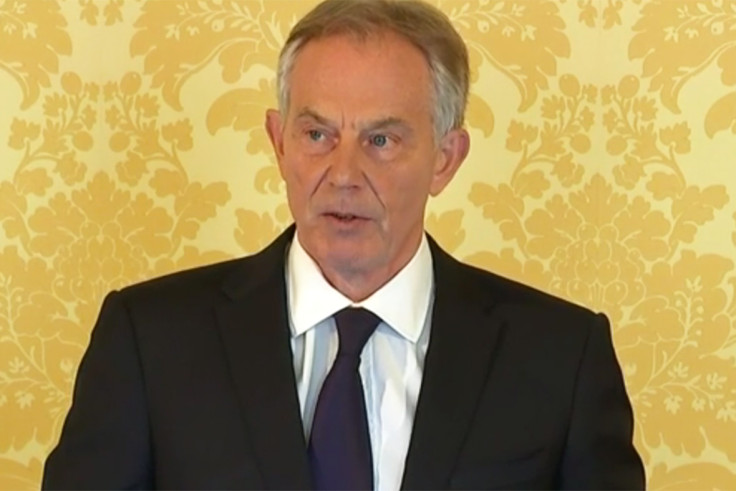
Key extract from Blair's speech, along with a video.
The decision to go to war in Iraq and remove Saddam Hussein from power in a coalition of over 40 countries led by the USA, was the hardest, most momentous, most agonising decision I took in ten years as British prime minister.
For that decision today I accept full responsibility, without exception and without excuse. I recognise the division felt by many in our country over the war and in particular I feel deeply and sincerely – in a way that no words can properly convey – the grief and suffering of those who lost ones they loved in Iraq, whether the members of our armed forces, the armed forces of other nations, or Iraqis.
The intelligence assessments made at the time of going to war turned out to be wrong. The aftermath turned out to be more hostile, protracted and bloody than ever we imagined. The coalition planned for one set of ground facts and encountered another, and a nation whose people we wanted to set free and secure from the evil of Saddam, became instead victim to sectarian terrorism.
For all of this I express more sorrow, regret and apology than you may ever know or can believe.
Blair says he has "always apologised" for inaccuracy of the intelligence of Iraq's WMDs. "I had to act on the information I had at the time...virtually every intelligence agency had reached to the same conclusions".
He asks: "If you knew for a fact this dictator had used chemical weapons on his own people and for a fact he had killed thousands of his own people and those of other countries......would you have taken that risk to leave him in power? Or eliminate it?"
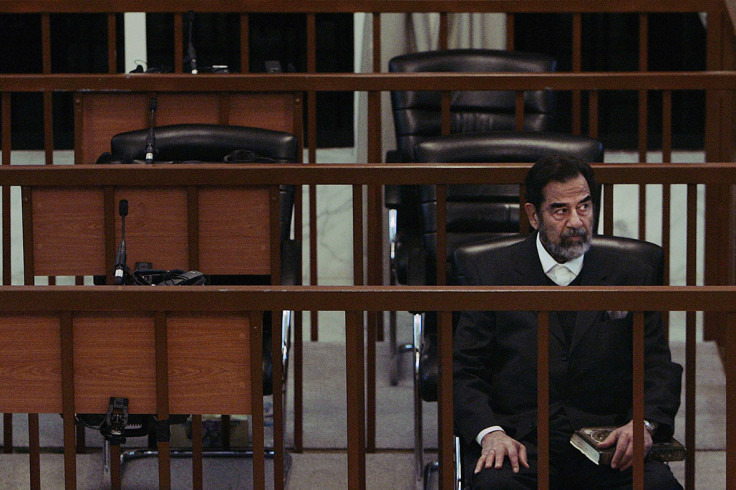
Blair said he "didn't have the option of that delay" to decide whether intervention would be needed at some point in future, as suggested by the report. "A decision had to be taken, and it was my decision as PM."
He added: "I took it, I accept full responsibility for it, I stand by it. I only ask with humility that the British people accept that I took this decision because I believed it was the right to thing to do based on the information I had and the threats I perceived and that my duty as PM in 2003 was to do what I thought was right...I thought the human cost of leaving Saddam in power would be greater for the world in the long term."

Blair says he hopes even those who "passionately disagree" with him at least understands why he did it.
Shared fears with the US that terror groups could have got their hands of WMDs and "Saddam regimes was the place to start" as his regime have previously used such weapons and was "capable of catastrophic actions".
Asks people "to put themselves as PM...you're seeing the intelligence mount up on WMDs...you have to at least consider possibility of 9/11 happening here."
He adds: "There was no rush to war.I was absolutely clear publicly and privately that we would be with the US" on the issue of combatting terrorism but "needed to go down UN route".
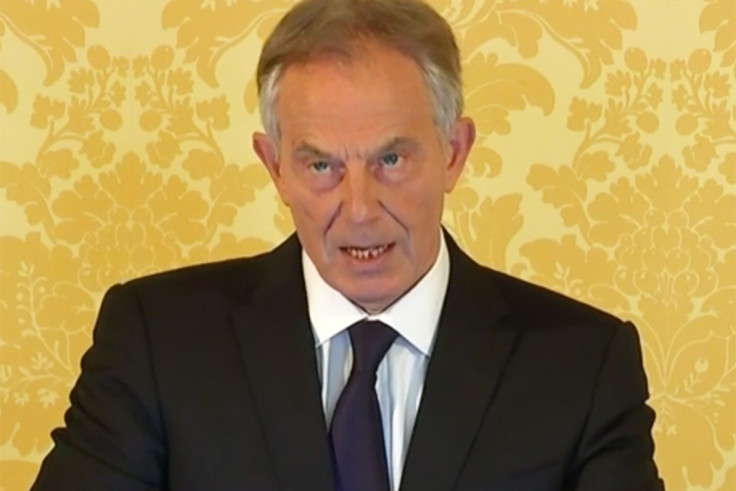
Former prime minister Blair, who was described in the Chilcot report as giving the go-ahead to invade Iraq based on "flawed intelligence and assessments" and belief that Iraq had WMDs on certainties that "was not justified" is now giving a conference on the inquiry.
Says he takes full responsibility for Iraq War and the number of deaths, expresses more "sorrow, regret and apology" than we could ever know or believe.
Disagrees Iraq would have bene better if the UK let Hussein stay in power and would have "threatened world peace" and "clung to power" during the Arab Spring with deadly power.
We have some more stories on the IBTimes UK published since the release of the report.
First up we have Chilcot's statement in full.
A look at the memos sent between Blair and Bush in the run up to the invasion
Reactions from the public and politicians to the report.
We also have a video from the press conference of the family of those who died in the war.
There is also a video rounding up some of the key findings from the report.
Next up is the anticipated statement from Corbyn, who has constantly spoke out against the war. However, given the length of the report which he has not had enough time to go through, Corbyn says the response today can only be a "provisional" one.
Corbyn starts by remembering and honour those killed in the Iraq War, including the hundreds of thousands of Iraqi civilians.
Tells MPs there is an "overwhelming" view that the war was illegal, adding the war "felled and spread terrorism" across the region.
The decision to invade Iraq on "flawed intelligence" led to a "fundamental breakdown" in trust in politics. Corbyn said "some of us got it right" and refers to the 1.5m people who marched against the war through London in 2003.
Said those Labour members who voted against the war "do not take satisfaction" in the report as "we have to be saddened" in what has been revealed.
Praises the late Robin Cook for speaking out at the time against the war.
https://t.co/eqINmEYqEj robin cooks resignation speech is all the more poignant. Listen
— kieran (@kierancarter_) July 6, 2016
Speaking in the House of Commons following PMQs, Cameron has promised two full days of debate on Chilcot report next week after MPs have had time to read through some of the 2.6 million words.
Cameron said the lessons learnt from the Chilcot report is that "taking country to war should always be a last report."
He added: "Sending our brave troops onto the battle field without the right equipment was unacceptable...we must pledge that it never happens again."
Lib Dem leader Tim Farron has also issued a statement regarding the Chilcot report.
He said:
"Far from being Bush's passenger, Blair was his co-pilot in taking this catastrophic decision which has destabilised Iraq, provided the hotbed for Daesh and tarnished Britain's reputation around the word." Daesh (Isis) has arisen from the complete absence of any post conflict planning by the government.
Charles Kennedy's judgement has been vindicated in every respect. I hope those in the Labour and Conservative parties who were so forceful in their criticism of him and the Liberal Democrats at the time are equally forceful in their acknowledgements today that he was right. An absence of scrutiny by the Conservative party opened the door for Blair and the Labour Government to pursue a counter-strategic, ill-resourced campaign.
"I hope Sir John Chilcot's findings can in some way provide comfort to the families of the British servicemen and servicewomen who lost their lives, and to the people of Iraq. Hundreds of thousands of Iraqis have lost their lives and a generation has been shaped by this illegal war.
"Blair was fixated in joining Bush in going to war in Iraq regardless of the evidence, the legality or the serious potential consequences."

One of the first MPs to give a response to Chilcot report is the SNP's Alex Salmond.
He said:
"The publication of the Report of the Iraq Inquiry by Sir John Chilcot today is welcome but long overdue.
"The report's forensic examination of thousands of pages of evidence and its firm conclusions are excoriating of a Prime Minister who, contrary to his denials, gave a pre-determined commitment to President Bush on 28 July 2002 to join US military action in Iraq. We now know that long before Parliament formally voted on whether or not to go to war in Iraq, Tony Blair had told George Bush - "I will be with you whatever".
"The subsequent actions of the then Prime Minister blundered the country into a war that has caused the deaths of 179 UK armed forces personnel, and almost 200,000 Iraqi civilians, and led the world into the present nightmare instability in the Middle East. It is shameful that the Chilcot Report found the UK's actions undermined the authority of the UN Security Council, and the Prime Minister's lack of commitment to collective decision-making and his determination to stand with the US before diplomatic options had been exhausted, led the country prematurely to war. It is now clear from the report that military action was not the last resort as Blair stood in Parliament on 18 March 2003 to ask MPs to support his case for war.
"And when the Iraqi regime headed by Saddam Hussein was toppled, Chilcot has found that it was Tony Blair who increased the risk of the UK failing to react to the unexpected in Iraq, and damaged the likelihood of achieving strategic objectives. There was no plan for the reconstruction of Iraq and for the provision of services to the Iraqi people, and there was no plan to deal with the violence that we saw explode in the months following the invasion.
"In the days, weeks and months ahead, the intimate detail of this report will only implicate further a former Prime Minister who recklessly committed the country to war without collective judgement, and personally failed to ensure there was a plan for delivering a future for the people of Iraq.
"After such carnage, people will ask inevitable questions of was conflict inevitable and worthwhile? The answer from Chilcot is undoubtedly no. And who is responsible? The answer is undoubtedly Tony Blair. There must now be a consideration of what political or legal consequences are appropriate for those responsible."
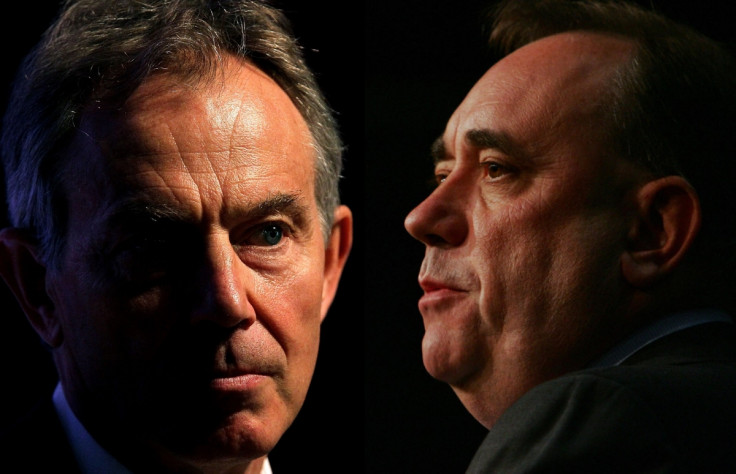
Sarah O'Connor, whose brother was killed in the Iraq War, described Tony Blair as the "world's worst terrorist" during an emotional press conference given by the troops' families.
She added: "There is one terrorist in this world that the world needs to be aware of, and his name is Tony Blair, the world's worst terrorist. If he is so sure of his decision, why isn't he here?"
Tony Blair has already issued a response to the Chilcot report, saying he still believes the decision to invade Iraq was taken "in good faith".
Blair said:
The report should lay to rest allegations of bad faith, lies or deceit. Whether people agree or disagree with my decision to take military action against Saddam Hussein; I took it in good faith and in what I believed to be the best interests of the country.
I note that the report finds clearly:
- That there was no falsification or improper use of Intelligence (para 876 vol 4)
- No deception of Cabinet (para 953 vol 5)
- No secret commitment to war whether at Crawford Texas in April 2002 or elsewhere (para 572 onwards vol 1)
The inquiry does not make a finding on the legal basis for military action but finds that the Attorney General had concluded there was such a lawful basis by 13th March 2003 (para 933 vol 5)
However the report does make real and material criticisms of preparation, planning, process and of the relationship with the United States.
These are serious criticisms and they require serious answers.
I will respond in detail to them later this afternoon.
I will take full responsibility for any mistakes without exception or excuse.
I will at the same time say why, nonetheless, I believe that it was better to remove Saddam Hussein and why I do not believe this is the cause of the terrorism we see today whether in the Middle East or elsewhere in the world.
Above all I will pay tribute to our Armed Forces. I will express my profound regret at the loss of life and the grief it has caused the families, and I will set out the lessons I believe future leaders can learn from my experience.
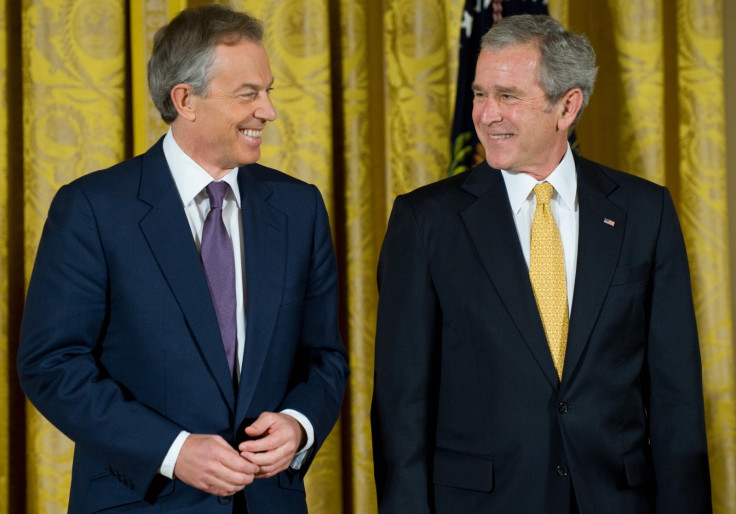
If anyone has a spare nine days, you can read the full report into the Iraq War from Chilcot here.
Here's the IBTimes UK's first take on the report - Tony Blair's rush to war when Saddam Hussein was 'not an imminent threat'.
"Sir John Chilcot has presented a damning indictment of the British case for invading Iraq, concluding that former Prime Minister Tony Blair's argument for going to war was based on "flawed intelligence and assessments" that "were not challenged [and] should have been."
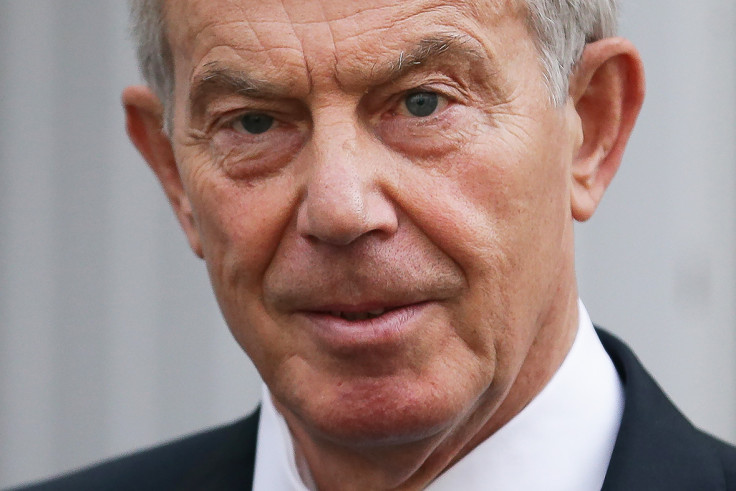
Some more key extracts from Chilcot's statement:
Blair had been advised that an invasion of Iraq was expected to increase the threat to the UK and UK interests from Al Qaida and its affiliates.
By early March [2003], the US Administration was not prepared to allow inspections to continue or give Mr Blair more time to try to achieve support for action. The attempt to gain support for a second resolution was abandoned.
In the Inquiry's view, the diplomatic options had not at that stage been exhausted. Military action was therefore not a last resort."
The consequences of the invasion and of the conflict within Iraq which followed are still being felt in Iraq and the wider Middle East, as well as in the UK. It left families bereaved and many individuals wounded, mentally as well as physically. After harsh deprivation under Saddam Hussein's regime, the Iraqi people suffered further years of violence.
Blair confirmed that he was 'solidly with the President and ready to do whatever it took to disarm Saddam' Hussein.
"Above all the lesson is that all aspects of any intervention need to be calculated, debated and challenged with the utmost rigour and when decisions have been made they need to be implemented fully. Sadly, neither was the case in relation to the UK government's actions in Iraq."
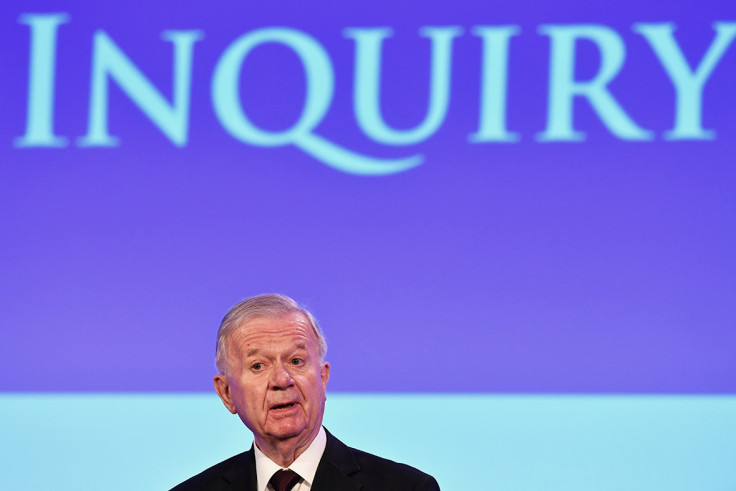
Policy on Iraq was based on "flawed intelligence and assessments" which were not challenged and "they should have been".
Chilcot also says that Blair had been warned military action would lead to great threat to the UK from terrorist groups such as al-Qaeda.
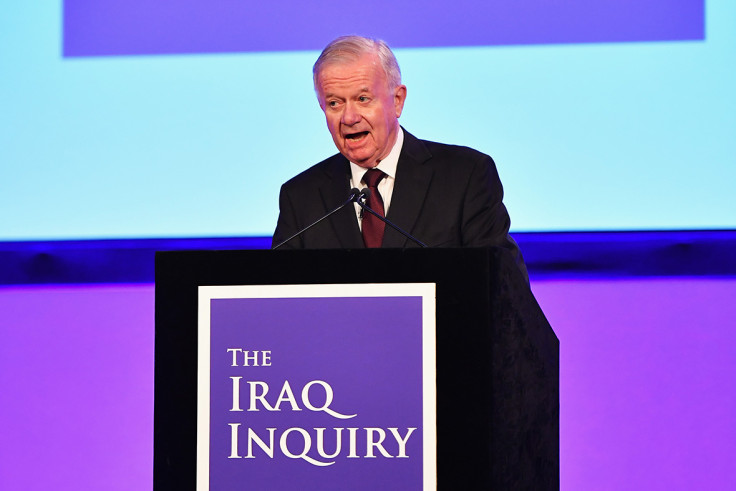
Chilcot now discussing the assessment of Iraq's WMD and how they were presented to support.
He says there was a belief in the UK that Iraq had chemical and biological capabilities and able to conceal activities from weapons inspectors. Blair told MPs the potential threat from Iraq's WMD "would one day become a reality". Chilcot said this "certainty was not justified" and it would take Iraq several years to build such arms.
Some key points form Chilcot's opening.
Saddam Hussein was an "undoubtedly brutal dictator" , but questions were whether it was right and necessary to invade Iraq and whether the UK could and should have been better prepared.
The UK chose to join ther invasion of Iraq before the peaceful options for disbarment had been exhausted and "not as a last resort". the suggestions the country had WMD were not justified and preparations of Iraq were "wholly inadequate".
The government also failed to achieve its objectives with regards to the invasion.
After seven years, Sir John Chilcot is finally about to reveal the findings of his report into the 2003 Iraq War. More updates to follow.

As we near closer to the release of the report, here IB Times UK has a look at who were the key figures in the run up to and the conclusion of the invasion of Iraq.
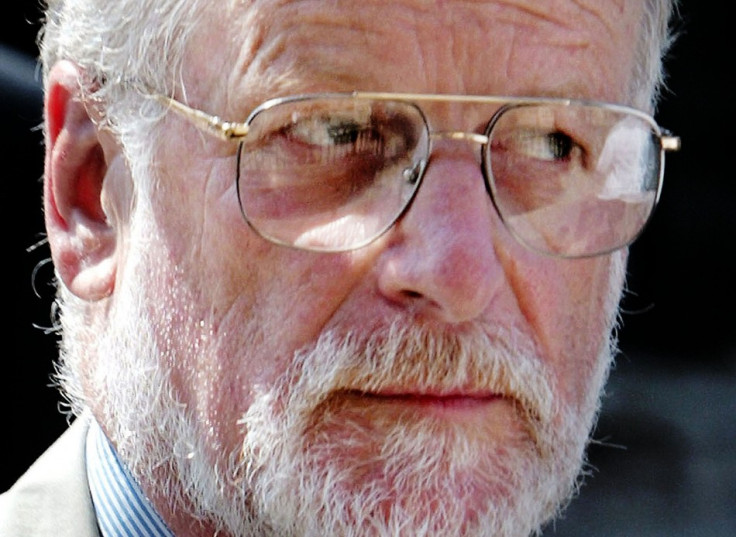
Our reporter Lewis Dean is down at Westminster to cover the Stop the War protests taking pace alongside the release of the Chilcot report.
Follow our Facebook Live feed of the demonstration here:
Live at the Westminster protest ahead of the release of the Ch...As we await the publication of the Chilcot Report, IBTimes UK talks to protesters in Westminster. Follow our live blog for updates: http://ibt.uk/A6aCh
Posted by International Business Times UK on Wednesday, July 6, 2016
A couple of graphics here just to emphasize the sheer size of this report.
An idea of just how long the Chilcot report is... pic.twitter.com/j0Jhl2hYsA
— Nick Eardley (@nickeardleybbc) July 6, 2016
The size of the Chilcot Iraq report pic.twitter.com/zVxKX3gaRi
— Press Association (@PA) July 6, 2016
A protest from the Stop the War coalition is due to take place in Westminster against Tony Blair and his involvement in the Iraq War.
A description on the event's page reads:
After a seven year wait the Chilcot Report is finally going to be published on June 6th. Despite its astounding length (2.3 million words) it is highly likely that it will fall short of an outright condemnation of the Iraq war and fail to apportion blame to those who were truly responsible for the catastrophe.
We ask you to join us on the day of publication outside the QEII Centre to demand #IraqTruthAndJustice
IBTimes UK will be reporting live form the scene of the protest throughout the day.
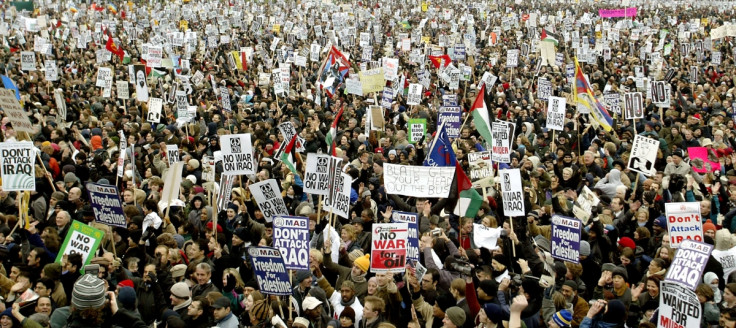
Tony Blair has left his home this morning to make his way to the publication of the report and was met with protesters demanding he face war crime charges.

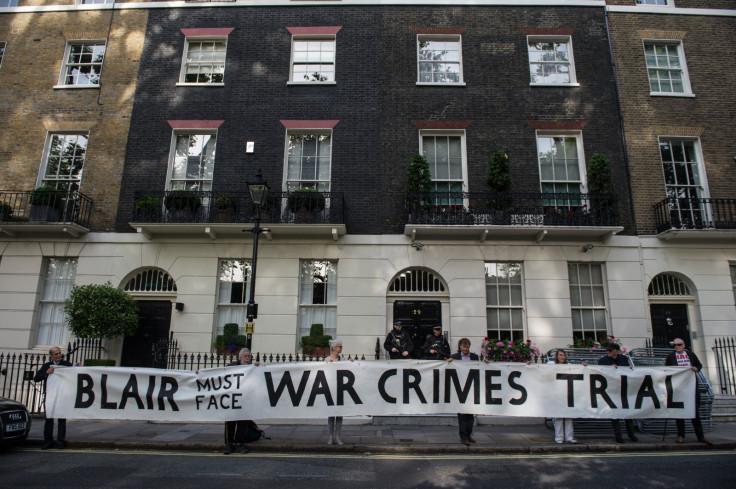
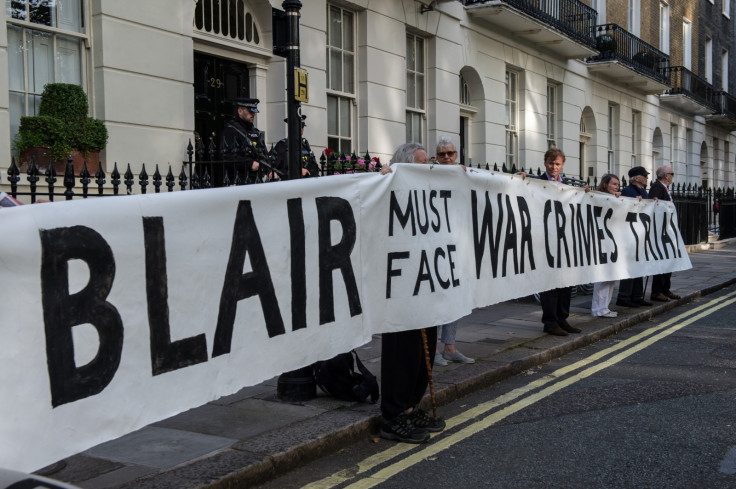
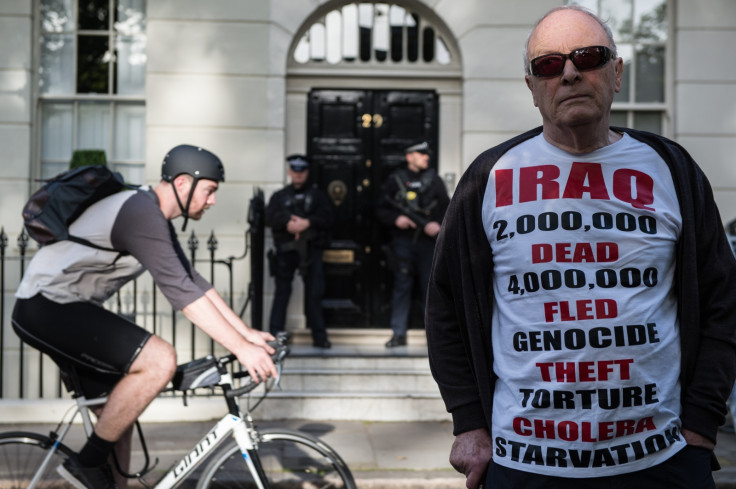
One of the many subplots from today will be the reaction of Labour leader Jeremy Corbyn, former chair of the Stop the War Coalition. There have been reports that under-pressure leader Corbyn is waiting until the release of the report before he stands down to give him a chance to accuse Blair of committing war crimes due to his involvement in the Iraq War.
Corbyn has ignored frequent calls to quit following the EU referendum result, having been criticised for not doing enough to campaign for Britain to remain, losing the confidence of a vast majority of his own MPs in the process.
Now newly promoted shadow defence secretary Emily Thornberry has urged the Labour leader not to attack Blair when he gives his statement on the Chilcot report later in the House of Commons in order to help unify the troubled party, according to The Times.
There were also previously suggestions that the main reason Labour have not put a candidate forward to challenge Corbyn for the leadership is that they cannot find anyone willing who was against the Iraq war as fielding a candidate who wasn't strongly opposed to the war may prove disastrous post-Chilcot.
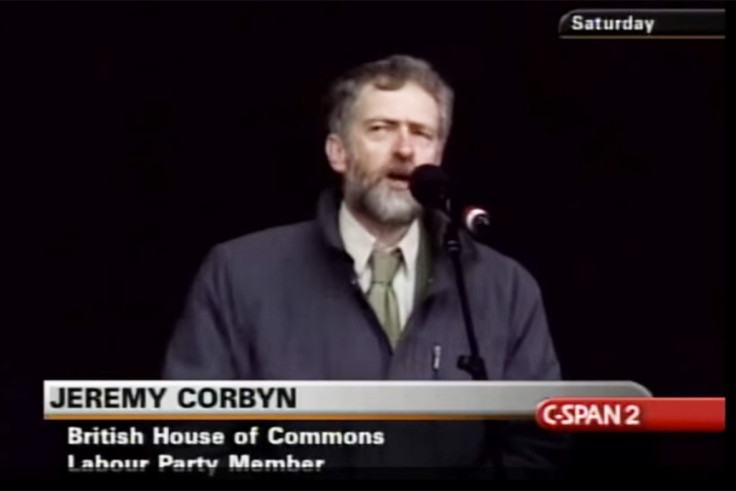
There have been constant fears that the report will essentially become a "whitewash" because it will not declare the 2003 war legal and neither is it expected to recommend Tony Blair go on trial for alleged war crimes.
Valerie O'Neill, whose son Kris was killed in 2007 in an IED attack, told the IBTimes UK: "Tony Blair has to answer for his actions, whether it is in a court of war here or in The Hague. He can't just walk away and say sorry [...] and go off to his merry life and all his millions. No. In my opinion he should be in the Hague, on war crimes [charges]."
Speaking to the Guardian prior to the report's release, Chilcot has downplayed certain figures will not criticise those who were in responsible for the Iraq war.
Chilcot said: "I made very clear right at the start of the inquiry that if we came across decisions or behaviour which deserved criticism then we wouldn't shy away from making it. And, indeed, there have been more than a few instances where we are bound to do that."
You can IBTimes UK's full interview with O'Neill here.
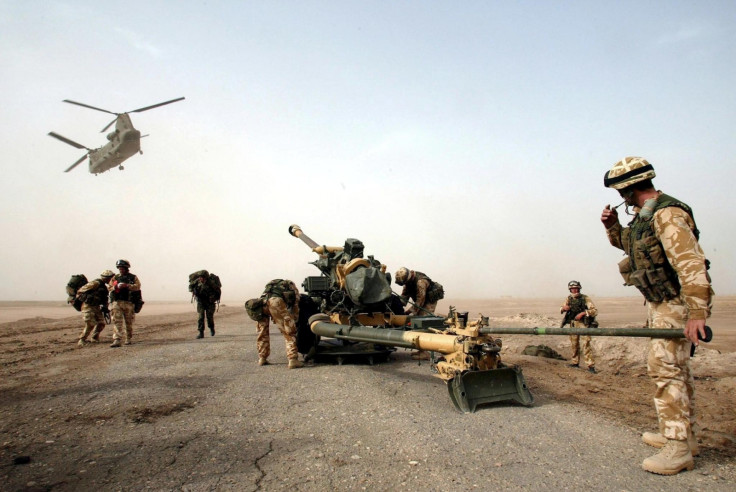
Elsewhere, we also have a timeline of the inquiry running up to the release of the report. The detailed run of events starts from September 2002 when former US president George Bush addressed the UN until when prime minister David Cameron received an advance copy of the text.
Read: Chilcot report: Timeline of Iraq inquiry from 'dodgy dossier' to proofreading 2.6m-word document
Before the release, here are some of the key numbers and figures surrounding the report:
2.6 million – the number of words in the Chilcot report, roughly three times the size of the complete works of Shakespeare and five times longer than War and Peace.
Seven – the number of years the report has taken to get published. Former prime minister Gordon Brown originally predicted it would take just over a year to be released when announcing the inquiry in 2009.
£10.3m ($13.4m) - the cost of the report to produce.
150,000 – Number of Government documents believed to have been examined and scrutinised for the report.
2011 – The year the final witness, former secretary of state Jack Straw, became the last of the 150-odd witness to give evidence to the inquiry. Other witness included Tony Blair, Gordon Brown and John Prescott.
197 – the number of British troops who died in the Iraq War.
A full IBTimes UK explainer into the Chilcot report with more facts and figures can be found here.
Good morning and welcome to the IBTimes UK's live coverage of the publication of the Chilcot report, the long-awaited inquiry into Britain's involvement in the Iraq War in 2003. Seven years after it was launched, the report has been examining the decision-making process which led to Britain invading Iraq as part of the US-led coalition.
The report, which runs to 2.6 million words, will be published just after 11am, once Sir John Chilcot has made a statement, with Prime Minister David Cameron and Labour leader Jeremy Corbyn expected to give statements on the report in the House of Commons.
Some of the families of the 179 troops who died in the war, along with some journalists, politicians and other involved parties, will be able to read the report from 8am.
Former prime minister Tony Blair, who will feature heavily in the report, is also expected to give a statement at some point today, with many hoping he is called into account for his role in leading Britain into one of the most controversial military actions the country has seen in recent history.
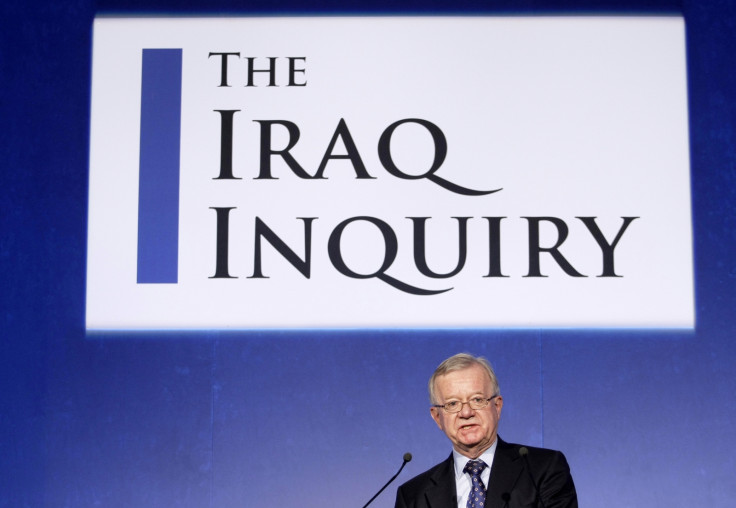
© Copyright IBTimes 2025. All rights reserved.






















